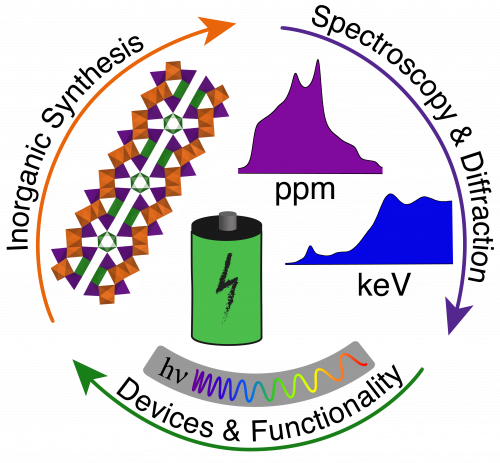Materials for Energy and Sustainability
We are living in an energy revolution. There is global momentum to move toward clean and efficient energy technologies while also improving access to reliable energy in rural and underserved regions. Progress toward these goals requires, in part, advanced materials, which can be developed by understanding the underlying synthetic, functional and degradation mechanisms. Some questions and material challenges we are interested in include fast charging batteries (<10 mins), non-traditional charge storage phenomena, electrode–electrolyte interactions, and probing ion dynamics and phase transitions.
Our work is rooted in diverse solid-state synthetic methodologies including routes to metastable materials. Techniques in the lab include high-temperatures (up to 1750 °C), molten salt or metal flux chemistry, pressurized hydrothermal/solvothermal reactors, mechanochemistry, and ion exchange. We are particularly interested in the oxide and (oxy)halide chemistry of the early transition metals.
In complex and multiscale materials like battery electrodes, it is helpful to link the local atomic structure, average structure, and microstructure by combining insights from techniques such as solid-state NMR spectroscopy, X-ray absorption spectroscopy, X-ray and neutron diffraction, and microscopy/imaging. An emphasis of our lab is leveraging the diverse toolkit of multinuclear solid-state NMR to obtain atomic-scale details of chemical structure, ionic and polyhedral dynamics, defect chemistry, and local electronic properties. Designing synthetic routes for isotopic enrichment enables access to exotic nuclei and/or the differentiation of reaction mechanisms. We also routinely work with DFT codes, numerical simulations, and model compounds to complement NMR spectra on functional, and often messy, samples. Experience with computational techniques enables us to work closely with theory collaborators.
A frequent challenge in complex materials design and characterization is bridging the gap between fundamental studies and applied challenges in manufacturing and deployment. In this respect, our group builds upon close relationships with industry colleagues in the global raw materials to battery materials supply chain. Technologies such as energy storage are rapidly evolving and can have immediate societal impact; interactions with industry help ensure relevance for our subset of applied studies and to convey our fundamental insights to a broader audience.
